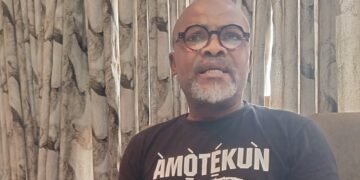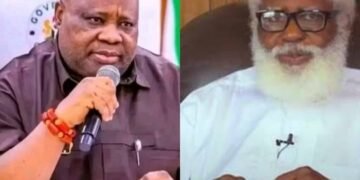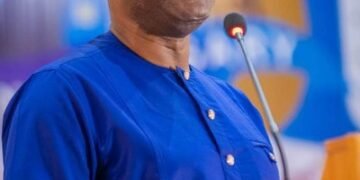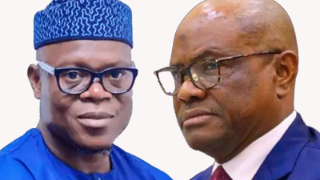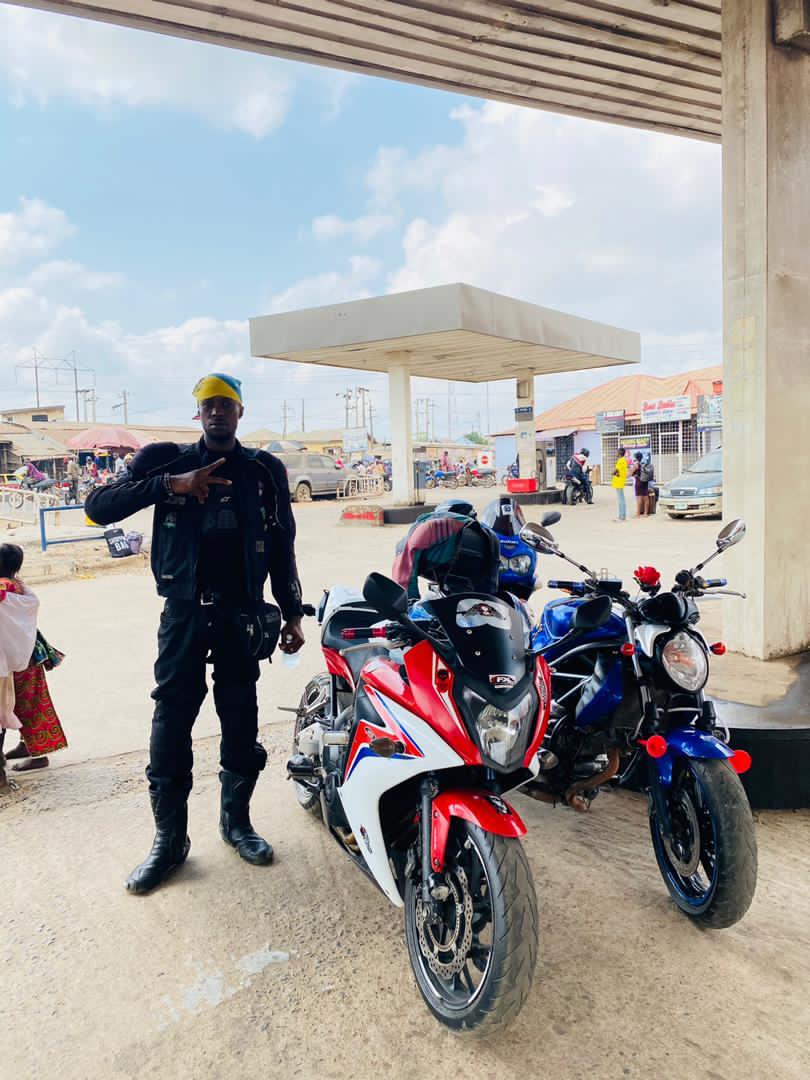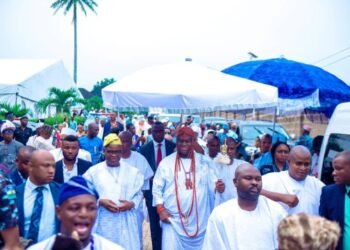My Passion For Power Bikes My Source Of Income– Lawee
Lawal Oluwole Adewunmi (aka Lawee), born in the mid-1980s, is the CEO of LAWEES MOTORCYCLE GEARS AND ACCESSORIES, a thriving power bike sales and spare parts outfit, based in Ibadan. The father of two who is married to one wife is also into farming, specialising in plantain and watermelon plantation. He speaks with NEWSCOVEN.NG on his growing up years, his passion and challenges in the business.
How is your growing up years?
I grew up in a nuclear family of five; my father, mother and siblings. I have a sister and a brother; I am the last born of the family. I attended Divine Primary School, formerly Tendercare Primary School in Adeoyo, Ibadan. From there, I went to Command Secondary School, Apata, Ibadan from 1996/1997 to 2002/2003. I had a regimented military upbringing. I was a boarder all through.
In 2005, I proceeded to the University of Agriculture, Abeokuta, Ogun State where I obtained my Diploma Certificate. I went to the Ekiti State University, formerly University of Ado-Ekiti, where I had my BSc in Banking and Finance. After my Bachelor’s Degree, I got married immediately and so, I couldn’t further my education.
You must be a hard guy to have left school and got married immediately. What informed that decision?
Actually, why I got married very early is that my girlfriend, who is now my wife, became pregnant. While we were contemplating what to do, as it is the normal thing among young people in relationships, I just changed my mind and told her that we should leave the pregnancy and that I will take of her and the unborn baby. She said, “no, I cannot leave the pregnancy. I am still in school”. But I insisted and told her that I will stand by her and take care of our baby. She did not believe me, but I was able too convince her.
I was posted to Ebonyi State for my mandatory one year National Youth Service Corps (NYSC) programme. But I had to redeploy back to Ekiti State then, all because of my wife because I had promised her that I am not going to leave her and the pregnancy. So, shortly before she got delivered of that baby, we got married. Thereafter, I was now posted to Osi-Ekiti in Ekiti State for the mandatory national youth service.
Is it the marriage that made you to stop your education?
It is not the marriage but the responsibilities which I felt there was no way I could be able to combine with pursuing a Master’s Degree programme, even as a young father.
I was not looking for job then because I have been in business since my days in the university. I felt that it is much better to be in business than investing in a higher degree. But as I am speaking with you, I am still going to invest in a Master’s Degree programme, but definitely not in Nigeria. I am working on that now.
Many young guys like you, after their university education, would be out there searching for jobs. Why did you decide to go into business, instead of looking for a job?
When I was in school, I studied Banking and Finance. My father was a banker; he retired from First Bank of Nigeria. He was well to do when he was in the banking sector. But immediately he retired, I noticed that my father was not doing well again. It is not that he was suffering, but I know that the standard had dropped. When I was in school, my father gave me a car to drive. I was getting all the necessary financial support.
But all these stopped when he retired. He could not even afford to pay my school fees any more. I paid my school fees from 300 Level to 400 Level. This was simply because he could not afford to pay the fees any longer. Here was a man that would give me my school fees and I would still collect some extra money. But after his retirement, he could only afford to give me half of my school fees.
There and then, I felt that, does it really make any sense looking for a job after graduating? This man worked for over 30 years in the banking sector. He is a grandfather and there is nothing much for him after retirement. Is this how I will also continue after graduating from school; working for a particular amount as salary at the end of each month and now retire almost empty-handed? At that point, I said, ‘no. It must not be like that.’
Why did you choose the business of selling power bikes, spare parts and accessories?
Right from when I was in the university, I have been a biker, riding motorcycles, also known as power bike or superbike. I was selling gloves. I would order for my gloves and riding gears. Whenever my orders arrived, people will come to me and say, “Lawee, I like this or that. Where did you get it?” I will tell them that I ordered them for myself. I didn’t even know then that doing such was a business opportunity and a source of income. I would give them gloves and some of the riding gears for free.
It was after I graduated from the university that I felt that this is a good opportunity for me. It was my passion and there and then, I converted my passion into my source of income. I started bringing in power bikes and accessories. But I incurred some losses and I had some big challenges, along the line.
Apart from sales of power bikes, parts and accessories, what other line of business are you into?
80 per cent of my business is motorcycle business, including the sales of motorcycles, motorcycle spare parts and accessories. I am also into farming but it is not a full-time thing. I am into plantation; I do both plantain and banana, but mostly plantain plantation. I also plant watermelon. But my motorcycle business is mostly what I do.
At the weekends, I go to my farm. I plant with my family and friends and we all go there to have fun. Once we are done with planting, we relax; we drink beer together and relax in the farm for about two, three hours. We would then leave and not return to the farm until probably the following weekend. And when we go there, we would just be there to water the plantation. So, it is not something that I have to do from Monday to Friday or spend the entire 24 hours of the seven days of the week. That is how I have been able to combine the two together. Even if I don’t go there, there is no problem. I can easily tell my and give her instructions on what to do at the farm.
How viable and lucrative is the power bike business?
It is a very lucrative business but highly capital-intensive and that is where the real challenge is. Superbike, its parts and accessories are no piece of cake. It is always very expensive. So, it is not a business that you can just jump into; that because you like power bike, you just want to start selling power bike, helmets and other accessories.
Like how much should a starter be looking for?
For a starter, I will just advise that you have to be in the business first. To start, you must have between N3 million and N4 million. I didn’t start with such an amount and this is because I have been riding power bikes, even before I saw it as a business opportunity. I can say that I started with something like N20, 000 or N50, 000. But it started like a joke for me.
How is the journey so far?
I have been riding power bikes for about 17 years, but I have been in the business since about eight years ago. To the glory of God, through the business, I have been taking care of my bills so far. That is all I can say for now. I have been eating three square meals per day and I have been paying my children’s school fees.
What really are the challenges?
The challenges include the fluctuating and escalating exchange rates and government policies. Then, during the COVID-19 pandemic period, we had challenges with shipments. On a good day, we ship in our goods from the United States of America within four to five days; from the United Kingdom, we ship in between one week. But with the COVID-19 pandemic, timing of shipment changed; airlines stopped operating.
For example, batteries for the power bikes stopped coming in through the airlines. We had to resort to shipment by sea. Since the outbreak of COVID-19, we are now having our shipments from the US taking up to three weeks, unlike the previous one week interval.
These challenges are seriously affecting the business. For example, if a customer orders for a particular spare part and you don’t have it in stock, if we place an order, it may eventually take two or three weeks to get it for the customer. He or she may feel disappointed, but I need to explain to you.
Again, the escalating and flunctuating exchange rate is affecting the business. Converting our Naira to Dollar or British Pound is killing. I pray and wish that the government will look into and work on that aspect.
How about patronage?
To the glory of God, and in spite of the challenges, we are still making sales. We have customers all over the country; we are not limited to only Ibadan. We have our customers in Abuja, Port Harcourt, Benin, Calabar, Lagos, Akure, Abeokuta…in fact, in almost all the states of the federation because there are bikers everywhere. With the help of the social media, we are networking.
What would it cost an average rider to get a power bike and get the complete kit?
A poor man can never go for a bike. The average cost of a complete brand new gear will cost you about N1 million. These include the helmet, jacket, pants, the riding boots and riding gloves and some others. We also have different grades of tokunbo gears. I will not advise a biker to go for tokunbo helmet, but he can go for any other tokunbo gear. Apart from the brand new helmet which is about N100, 000, you can get other tokunbo gears with about N200, 000.
And to get a good power bike, with the current exchange rate, the minimum cost, depending on the capacity and the year, is from N500, 000 upwards. If you want to get the 2020 edition of any power bike, you should just budget like N10 million for it.
Why should I go for a power bike when I can get a very good car with N10 million?
Yes, you can get a very good car with N10 million, but such a car cannot serve the purpose of a bike. The bike serves more purposes than just taking you to your destination within the shortest time possible. But you may not understand this and that is why we do say, ‘if you don’t ride it, you don’t know’.
There is this general impression that bikers are reckless and that more often, when accident happens, it tends to be fatal. How are you coping with these negativities?
It is true that the general belief of the layman and the public is that bikers are reckless and that all bikers are hoodlums. But among us, we have very responsible men; responsible fathers, mothers, sisters and wives. We also have grandfathers among us. I am not sure if we have grandmother-bikers in Nigeria yet, but we have grandfather-bikers here with us. We have professionals, including journalists like you, medical doctors, lawyers and top businessmen and great women.
For example, the former governor of Cross River State, Donald Duke, is a great biker and the present governor of that state, Professor Ben Ayade, is also a biker. So, bikers are responsible breed because we also want to ride that bike and still go back home to meet our families who are waiting for us. We are not reckless; we obey traffic laws.
What then accounts for the near-fatal accident whenever it happens to any biker?
That is why we call it accident; an accident can happen at any point in time. I had a very terrible accident some two years ago. But it happened through a motorist that hit me from behind. I was not the cause of the accident; I was not under the influence of anything.
So, accident can happen at anytime. But the only thing we need to do is just to be careful. Then, we also have to beg and sensitise members of the public to also beware of bikers. Once they see a biker with a lousy bike, they should not see that person as an irresponsible person. They should know that that biker is somebody’s husband, son, father or grandfather.
Respect is mutual and we all have equal claim to the road. If you want a motorist to respect a biker, what are your duties and responsibilities to earn such a respect?
As a biker, like I said, we obey traffic rules; we give room and space for other road users and the vehicle that is in front or behind us. The only thing that intimidates other road users is the loud pipe on the bikes. This is why most people feel that we are intimidating them or that we are reckless. Fine, I have a loud pipe on my bike, but I can’t expect someone to hit me from my rear and I would not rev. I need to rev and speed away to avoid being hit, but that does not make me an irresponsible biker.
What are you doing to further sensitise bikers as regards safety on the road?
Normally, every year, we do have what we called Bikers’ Safety Initiative (BSI). This is organised by all bikers across the country. We have 36 states and the FCT. We do hold the annual BSI in almost 26 or 27 states. With BSI, we take the sensitisation programme to all major road junctions, in conjunction with the NURTW and the normal commercial okada riders (we call them out distance cousins). We sensitise them; we tell the commercial okada riders the advantages of using their helmets. Most of them will say they cannot afford to buy a helmet. But we do tell that if they are involved in serious accident or road crash, they are gone. They can still afford to buy a helmet for as low as N10,000.
So, we do sensitise the public on how to use the road. We also let them know that the same right that a biker has is the same right that a motorist, an okada rider and even the pedestrian has. We all have equal rights to the roads.
Because of the COVID-19 pandemic, we could not hold the 2020 edition of BSI. But hopefully, by God’s grace, BSI would organise another road safety sensitisation programme, later this year.


